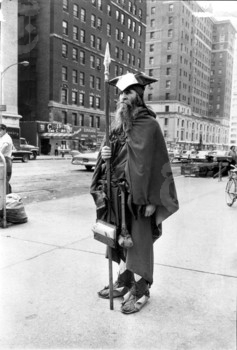Today there is a nice lengthy post on one of my favorite books, Alan Watts' classic The Book: On the Taboo Against Knowing Who You Are. There haven't been many books in my life that I've found to be so consistently rich and rewarding that I've been compelled to actually carry them around on my person for weeks at a time. I can think of just two: Watts' The Book and Ralph Waldo Emerson's Nature and Selected Essays. (Any reader of this blog knows how much I love Ulysses and Finnegans Wake but both are weighty, encyclopedic tomes dense with obscurity. Not ideal for carrying around in your pocket.)
Watts is undoubtedly one of the all-time great Western scholars on Eastern philosophy and this brilliant little book is essentially a philosophical lecture on the Hindu Vedanta perspective of the universe and man's place in it, explained in the most basic terms that a child could understand. It also serves as a nice summation of Watts' work as whole. There is a great collection of over thirty Alan Watts audio lectures on iTunes that I purchased a while back and I find myself coming back to these lectures over and over again for their soothing eloquence, humor, and Watts' unique combination of scholarship and wisdom. It's safe to say The Book is a distillation of his philosophy into a very compact, accessible format.
Definitely go check out the Brain Pickings breakdown and here's a snippet from Watts:
We suffer from a hallucination, from a false and distorted sensation of our own existence as living organisms. Most of us have the sensation that “I myself” is a separate center of feeling and action, living inside and bounded by the physical body — a center which “confronts” an “external” world of people and things, making contact through the senses with a universe both alien and strange. Everyday figures of speech reflect this illusion. “I came into this world.” “You must face reality.” “The conquest of nature.”
This feeling of being lonely and very temporary visitors in the universe is in flat contradiction to everything known about man (and all other living organisms) in the sciences. We do not “come into” this world; we come out of it, as leaves from a tree. As the ocean “waves,” the universe “peoples.” Every individual is an expression of the whole realm of nature, a unique action of the total universe. This fact is rarely, if ever, experienced by most individuals. Even those who know it to be true in theory do not sense or feel it, but continue to be aware of themselves as isolated “egos” inside bags of skin.




